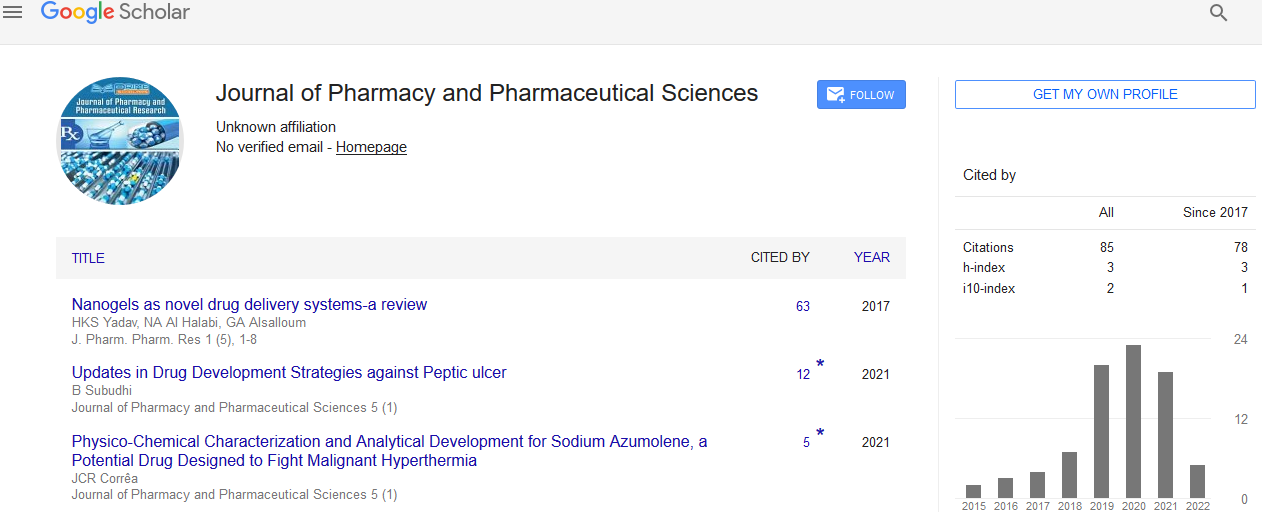Short Communication - (2022) Volume 6, Issue 4
Pharmacology Mechanisms of Toxicology
Claus Salvatore*
Department of Pharmacy, University of Perth, Australia
*Correspondence:
Claus Salvatore,
Department of Pharmacy, University of Perth,
Australia,
Email:
Received: 01-Aug-2022, Manuscript No. IPIPR-22-14279;
Editor assigned: 03-Aug-2022, Pre QC No. IPIPR-22-14279 (PQ) ;
Reviewed: 17-Aug-2022, QC No. IPIPR-22-14279;
Revised: 22-Aug-2022, Manuscript No. IPIPR-22-14279 (R);
Published:
29-Aug-2022, DOI: 10.21767/ipipr.6.4.20
Introduction
Pharmacology has advanced throughout the long term. Initially a
logical discipline that portrayed the clear impacts of naturally dynamic
synthetic substances, pharmacology currently investigates
the sub-atomic instruments by which medications cause organic
impacts. In the broadest sense, pharmacology is the investigation
of how compound specialists, both normal and engineered (i.e.,
drugs) influence natural frameworks. This envelops examination of
the deduction, compound properties, physiological and social impacts,
and components of activity, natural changes, and the remedial
and non-restorative purposes of medications. Pharmacological
investigations can decide the impacts of substance specialists
upon subcellular, foundational, physiological or conduct processes;
center around the treatment and anticipation of infections; or
manage the likely perils of pesticides and herbicides
Description
Pharmacology is in many cases depicted as a scaffold science since
it consolidates information and abilities from various essential science
disciplines including physiology, organic chemistry and cell
and sub-atomic science. Pharmacologists can ‘make an interpretation
of’ such information into the reasonable improvement of
therapeutics. Because of their multidisciplinary preparing, pharmacologists
can offer a one of a kind viewpoint in settling drug,
chemical and substance related issues [1]. The interdisciplinary
idea of the field offers pharmacologists an assortment of exploration
potential open doors not tracked down in that frame of mind
of logical request. It is this adaptability as well as the potential for
the functional utilization of exploration that draws in individuals
into becoming pharmacologists. Pharmacology helps individuals
all over the planet to carry on with better lives for longer and you
can find it all over the place. Pharmacology is there when you visit
the dental specialist and have an infusion to numb your mouth [2].
Pharmacology is there when you take medication for a migraine.
Pharmacologists made roughage fever tablets, anti-microbials,
disease medicines, and numerous different meds that great many
of us utilize every day [3]. Without pharmacologists we wouldn’t have the option to find new prescriptions to assist with battling
diseases Pharmacology All over The Planet Craftsmanship, ensure
meds are protected, comprehend the reason why a few medications
turn out preferable for certain individuals over others, comprehend
the reason why a few medications cause fixation. Pharmacology
is at the front of our battle to assist with guaranteeing
everybody has the amazing chances to carry on with solid lives for
longer. Pharmacologists all over the planet are currently: Developing
meds to handle new diseasess, distinguishing new medicines
when old ones quit being powerful, finding new drugs, investigating
how we can best utilize the meds we as of now have handling
anti-microbial opposition, concentrating on maturing to assist us
with all carrying on with better lives for longer, exploring to ensure
prescriptions are compelling for everybody, assisting with ensuring
that everybody is recommended the right meds for them [4]. The
pharmacological impacts of opium are because of its substance of
morphine and, less significantly, codeine.
Conclusion
Morphine poisonousness is a consequence of broad focal sensory
system (CNS) discouragement, which can bring about tiredness,
bewilderment, and ataxia at low dosages and at high portions can
prompt loss of cognizance, apnea, and passing. Sedatives collaborate
with stereospecific and storable restricting locales principally
situated in the CNS. Collaboration with these receptors impersonates
the activities of endogenous enkephalins and endorphins.
Their activity likewise seems to include a modification in the arrival
of synapses, like the hindrance of acetylcholine, norepinephrine,
and dopamine. Pharmacological impacts of medications (for
example their impacts on cells, organs and frameworks) are, on a
fundamental level, easy to quantify in creatures, and frequently
likewise in people. We can quantify consequences for pulse, plasma
cholesterol focus, mental capability, and so on, easily.
Acknowledgement
The author is grateful to the journal editor and the anonymous reviewers for their helpful comments and suggestions.
Conflict of Interest
The author declared no potential conflicts of interest for the research,
authorship, and/or publication of this article.
REFERENCES
- Rosa Gian M, Gigli L, Tagliasacchi MI, Di Iorio C, Carbone F, et al. (2016) Update on cardiotoxicity of anti-cancer treatments. Eur J Clin Invest 46(3): 264-284.
[Crossref] [Google scholar] [PubMed]
- Guengerich FP (2011) Mechanisms of drug toxicity and relevance to pharmaceutical development. Drug Metab Pharmacokinet 26(1): 3-14.
[Crossref] [Google scholar] [PubMed]
- Rodenas MC, Cabas I, Abellán E, Meseguer J, Mulero V et al. (2015) Tamoxifen persistently disrupts the humoral adaptive immune response of gilthead seabream (Sparus aurata L). Dev Comp Immunol 53 (2): 283-292.
[Crossref] [Google scholar] [PubMed]
- Rudmann, Daniel G (2013) On-target and off-target-based toxicologic effects. Toxicol Pathol 41(2): 310-314.
[Crossref] [Google scholar] [PubMed]
Citation: Salvatore C (2022) Pharmacology Mechanisms of Toxicology. J Pharm Pharm Res. 6:20.
Copyright: © 2022 Salvatore C. This is an open-access article distributed under the terms of the Creative Commons Attribution
License, which permits unrestricted use, distribution, and reproduction in any medium, provided the original author and source
are credited.

